Introduction
AI technology has played a significant role in healthcare. One of the most interesting and logical roles is conversational AI for healthcare.
The role of conversational AI goes beyond basic understanding of human language, voice recognition, and incorporating basic algorithms.
It is changing how doctors deal with their patients using machine learning and AI. From arranging appointments for doctors to generating prescriptions for patients, AI can revolutionize the healthcare industry. In this blog, we will understand the meaning, types, benefits, and various use cases of conversational AI for healthcare.
Let's dive into it!
What is Conversational AI?
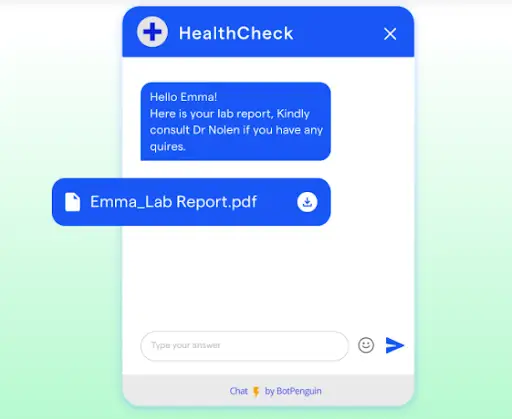
Conversational AI is a technology that enables machines to understand and process human language in a natural conversational manner.
Conversational AI aims to have a seamless interaction that imitates human conversation, making technology applicable in many other areas like healthcare.
In the context of conversational AI healthcare, it can simplify interactions by scheduling medical appointments or responding to patient questions. this leads to an improved patient experience as well as operational efficiency.
It uses a combination of systems like natural language processing (NLP), natural language understanding (NLU), and machine learning (ML) to understand the data input and provide appropriate responses.
- Natural Language Processing: This technology lets conversational AI chatbots understand and generate human language.
NLP enables the analysis of the speech and text inputs and engages in meaningful conversations with the users.
- Natural Language Understanding: It is a subset of NLU that interprets the word meanings in the input provided.
It works on grasping what is said and providing accurate personalized responses.
- Machine Learning: ML algorithms are used to train conversational AI systems on large datasets, allowing them to learn and improve over time.
This adaptability is vital for handling the diverse and complex nature of healthcare interactions.
Historical Context and Development
The integration of AI in healthcare has a rich history marked by significant milestones and developments. Initially, AI's role in healthcare was limited to decision support systems and basic diagnostic tools.
However, with the advancement of NLP and ML technologies, the scope of AI has expanded dramatically.
- Early Applications: The first applications of AI in healthcare trace back to the development of expert systems in the 1970s and 1980s.
These systems, such as MYCIN and INTERNIST-I, were designed to assist clinicians with diagnostic processes and treatment recommendations.
- Modern Evolution: The 2000s saw a surge in AI research and development, driven by improvements in computational power and the availability of large datasets.
This era marked the emergence of more sophisticated AI tools capable of handling complex medical data and providing actionable insights.
- Current Landscape: Today, conversational AI healthcare is characterized by advanced chatbots and virtual assistants that can perform many tasks, from patient triage to mental health support.
Notable examples include IBM Watson Health, which leverages AI for oncology and genomics, and virtual assistants like Ada Health and Buoy Health which provide personalized health guidance.
Case Studies and Examples
Several case studies highlight the transformative impact of conversational AI healthcare:
- IBM Watson for Oncology: IBM Watson utilizes NLP and ML to analyze large volumes of medical literature and patient data, aiding oncologists in developing personalized cancer treatment plans.
This system has demonstrated significant potential for improving diagnostic accuracy and treatment outcomes.
- Ada Health: Ada Health's AI-powered health assistant app guides users through questions about their symptoms, providing insights and suggesting possible causes.
This tool exemplifies the use of conversational AI healthcare for preliminary diagnosis and patient education.
- Buoy Health: Buoy Health's AI chatbot assists users in identifying potential medical conditions based on their symptoms.
By leveraging advanced NLU capabilities, Buoy Health can offer tailored recommendations and guide users toward appropriate care.
Features of the Best Conversational AI Solutions for Healthcare
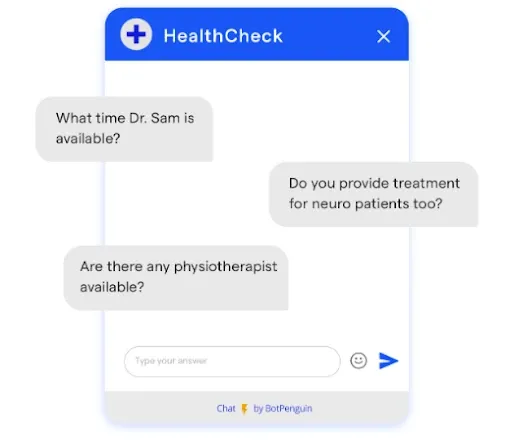
When contrasted with conventional administration arrangements, the present applications for the the best conversational AI solutions in health care may look like magic.
Some of the best AI-powered tools, which include healthcare chatbots by BotPenguin, have various sophisticated features. Here are a few of the most notable ones.
Symptoms Checking
AI-based symptom checkers enable patients to self-assess their symptoms which will give them an idea of what might be causing their symptoms or diseases.
By comparing symptoms to an extensive medical database, these tools help users choose suitable care, enhance early diagnosis, and reduce unnecessary consultations.
Booking Appointments
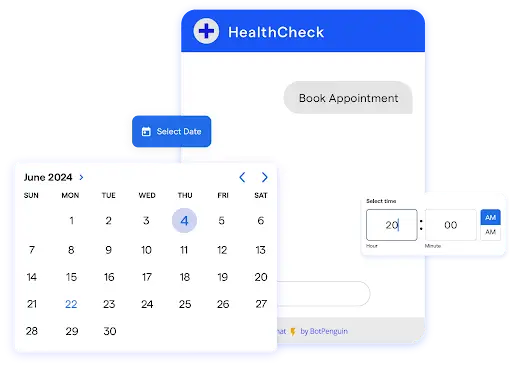
Patients can select and schedule time slots from available openings with ease through the best conversational AI solutions.
Doing so not only hastens the scheduling process but also integrates into calendar systems avoiding conflicts and ensuring efficient time management.
Collecting Patient Data
Patient information should be collected and managed via online forms and questionnaires before appointments.
This process automates away much physical paperwork while improving data accuracy thereby streamlining check-in at a reduced administrative workload.
Automated Prescription Refills
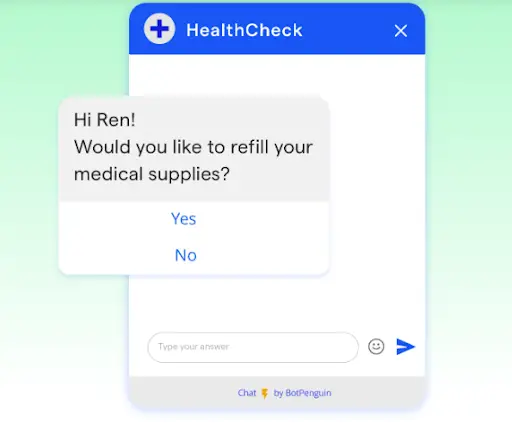
Patients can request prescription refills through a healthcare chatbot, automating the refill process and ensuring medications are delivered on time.
This feature minimizes manual intervention and helps maintain consistent medication regimens.
Insurance Coverage and Claims Assistance
Chatbots assist patients in understanding their insurance benefits and managing claims, reducing administrative burdens, and providing clear guidance on coverage options.
This support helps streamline the claims process and improves patient satisfaction with insurance handling.
Select Hospital Beds
AI solutions enable patients to book hospital beds remotely, facilitating quick access to necessary medical care.
This feature helps in managing bed availability effectively, especially in emergencies, reducing delays, and optimizing hospital resource allocation.
Schedule Blood Donations
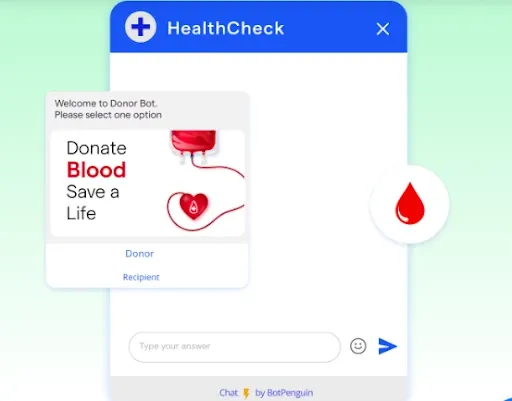
Conversational AI healthcare chatbots can inform patients about blood donation procedures, check available blood types, and schedule appointments for donors and recipients.
This feature enhances the efficiency of blood donation drives and ensures that both donors and recipients are managed effectively.
Wellness Program Recommendations
AI-powered chatbots can analyze patient data to recommend personalized wellness programs tailored to individual health needs.
This promotes proactive health management and offers targeted advice, enhancing patient engagement and adherence to wellness plans.
Use Cases of Conversational AI Healthcare Chatbots
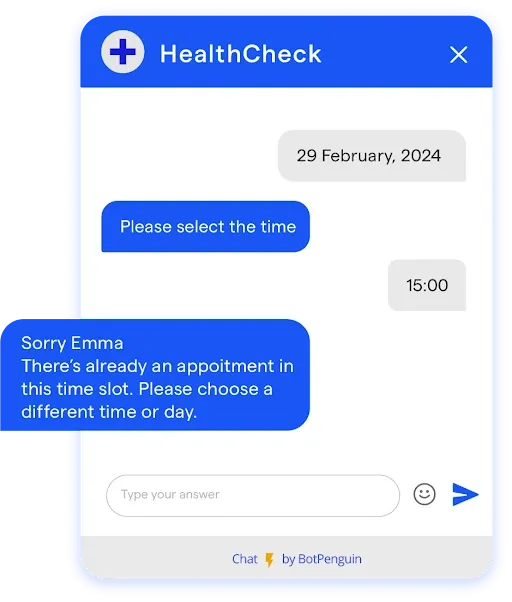
The large variety of use cases of conversational AI healthcare chatbots can be classified into following based on the purpose they serve-
- For patients seeking healthcare information: Individuals looking for healthcare consultation and services can schedule their appointments, book hospital beds, and receive regular healthcare tips instantly with healthcare chatbots.
- For hospitals and clinics: Hospitals and clinics can manage the information regarding medicines and equipment issued, data of patients admitted in the hospitals, and other administrative tasks using the best conversational AI solutions for healthcare.
- For pharmacies and drugstores: Pharmacies and drugstores can use AI to maintain proper records of the medicines issues received by the store, track inventory, and provide alerts once a particular medicine reaches its reorder level and also provide estimates of the demand for a particular medicine based on its previous demand.
- For health and wellness organizations: Health and wellness organizations can provide regular wellness program recommendations and updates to their members, keeping them engaged through the best conversational AI healthcare chatbots.
Benefits of Best Conversational AI Solutions
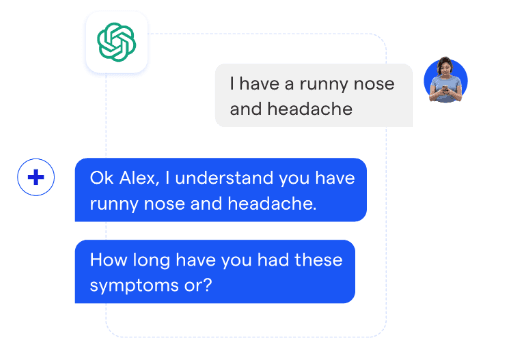
The best conversational AI solutions deliver several key advantages that significantly improve the patient experience and outcomes.
By automating routine tasks and providing immediate, personalized support, this technology ensures that healthcare is more accessible and responsive.
- Save money: Replace the extensive use of human resources with the use of the best conversational AI solutions. You can automate routine tasks and administrative processes, and save costs realized by healthcare organizations.
- Save time: The best conversational AI healthcare chatbots provide prompt feedback and assistance that minimizes waiting times therefore enabling patients to access information or services they require quickly.
- Save manual effort: For instance, the automation of tasks such as appointment scheduling, refilling prescription drugs, and checking insurance claims lowers staff’s manual work hence allowing them to concentrate on more intricate care tasks for the patients.
- Automated healthcare: Including medication management, appointment reminders symptom assessment, etc., this technology is used in various healthcare sectors for automated handling.
- Streamline consultations: They can pre-screen patients for chatbots thereby making it easier for them to get necessary information before consultations with doctors.
- Prevent double bookings: Additionally, using the best conversational AI solutions prevents double booking and optimizes the availability of healthcare resources by integrating them into scheduling systems.
- Enhanced patient understanding: Patients receive instant clear knowledge about their health condition, treatment choices, or how healthcare procedures are conducted.
Suggested Reading:
Top 5 Reasons Why BotPenguin is the Best Healthcare Chatbot Available
Security and Privacy Measures with Conversational AI Solutions
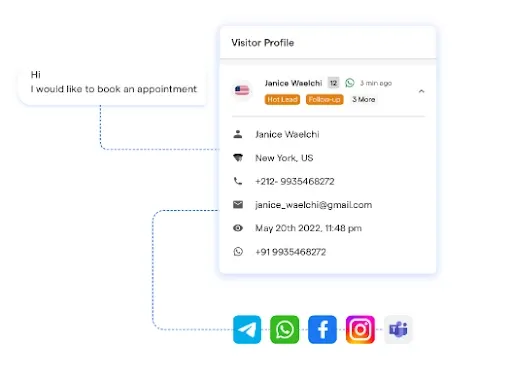
- Data Encryption: Encrypt data both in motion and at rest for protection against unauthorized access and confidentiality purposes.
- Compliance with Regulations: To meet the legal requirements for protecting and privacy of data, abide by HIPAA in the U.S. And GDPR in Europe.
- Authentication and Access Controls: Only permitted personnel can access certain information by using two-factor authentication, or role-based access control.
- Regular Security Audits and Updates: Regularly conduct security audits to fix vulnerabilities and protect better.
- Data Anonymization: Make sure patient identities remain hidden while using health records for analysis to reduce the exposure of private information in such a way that it remains anonymous.
- Secure Communication Channels: All interaction between AI systems with users must be encrypted to avoid unauthorized persons getting hold of any part of it.
- Transparency and Consent: Privacy policies should be explicit enough to capture what personal details are being collected from patients, why this is being done, how it will be used, etc., and informed consent on these matters should be sought from patients by doctors before proceeding further into their cases or otherwise treating them.
- Incident Response Plan: Prepare a plan to help you initiate immediate actions when there is a data breach, then call people who may have been affected; these steps are crucial when trying to limit damage caused by trust deficits.
Suggested Reading:
11 Tips for Crafting an Effective Healthcare Marketing Plan
Real-Life Examples of Using Conversational AI for Healthcare
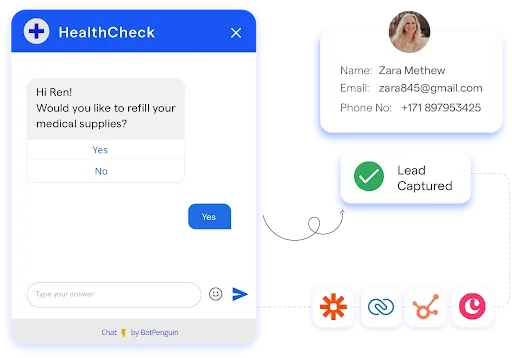
Conversational AI is revolutionizing healthcare with practical applications:
- Virtual Health Assistants: Babylon Health uses AI to offer virtual consultations, providing preliminary diagnoses and guidance based on symptoms.
- Appointment Scheduling: HealthTap employs AI chatbot to handle appointment bookings and reminders, reducing administrative tasks and no-shows.
- Medication Management: Medisafe sends reminders and tracks medication adherence, helping patients stay on schedule.
- Mental Health Support: Woebot provides mental health support through AI-driven conversations, offering coping strategies based on cognitive-behavioral therapy.
- Patient Education: Your.MD delivers personalized health information and answers questions through an AI chatbot, empowering patients with accurate knowledge.
These examples showcase how conversational AI enhances patient care and operational efficiency in healthcare.
Conclusion
As we've explored the transformative impact of conversational AI healthcare, it's clear that this technology enhances patient care, streamlines operations, and addresses complex challenges. Choosing the right tool is crucial for healthcare providers looking to implement these solutions.
BotPenguin offers a powerful option—a user-friendly, no-code conversational AI healthcare chatbot platform that simplifies integrating AI into various platforms.
With the ability to create chatbots for WhatsApp, Facebook, Instagram, and more, plus over 60 integrations ranging from CRM to task management, BotPenguin makes adopting conversational AI solutions accessible and efficient, meeting diverse healthcare needs with ease.
Suggested Reading:
Launching Healthcare Chatbot in 8 Easy Steps with BotPenguin
Frequently Asked Questions (FAQs)
What is the role of conversational AI in healthcare?
Conversational AI healthcare enhances patient interaction, automates administrative tasks, and supports real-time data analysis, improving healthcare services and patient outcomes.
How does conversational AI healthcare ensure privacy and security in healthcare?
Conversational AI implements robust encryption and compliance with healthcare regulations like HIPAA to protect sensitive patient data and ensure privacy.
Can conversational AI healthcare reduce costs?
By automating administrative tasks and optimizing patient management, conversational AI can significantly reduce operational costs and enhance service efficiency in healthcare settings.
What are the potential risks of using conversational AI in healthcare?
Potential risks include data privacy concerns, dependency on technology, and the need for continuous updates and maintenance to ensure accurate and ethical AI performance.
How does conversational AI handle emergency healthcare situations?
Conversational AI can quickly triage symptoms and direct patients to appropriate emergency services, but it should complement rather than replace professional medical advice in critical situations.
How does conversational AI integrate with existing healthcare systems?
Conversational AI integrates through APIs and can be tailored to work with existing EHR systems, allowing seamless operation alongside current healthcare technologies.

